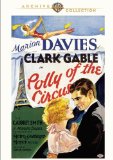| Reviews & Columns |
|
Reviews DVD TV on DVD Blu-ray 4K UHD International DVDs In Theaters Reviews by Studio Video Games Features Collector Series DVDs Easter Egg Database Interviews DVD Talk Radio Feature Articles Columns Anime Talk DVD Savant Horror DVDs The M.O.D. Squad Art House HD Talk Silent DVD
|
DVD Talk Forum |
|
|
| Resources |
|
DVD Price Search Customer Service #'s RCE Info Links |
|
Columns
|
|
|
Polly of the Circus (Warner Archive)
Entertaining tosh, when the leads play together. Warner Bros.' fabulous Archive Collection, their vault of hard-to-find library and cult titles, has released Polly of the Circus, the 1932 M-G-M remake of the old Goldwyn silent melodrama from 1917...based on the even older play by Margaret Mayo. Starring the delightful Marion Davies, a miscast (but game) Clark Gable, and a solid supporting cast including C. Aubrey Smith, Raymond Hatton, and David Landau, Polly of the Circus may be melodramatic tripe in the end...but it's works almost exclusively because of the attractive leads. No extras for this okay-looking black and white full-screen transfer.
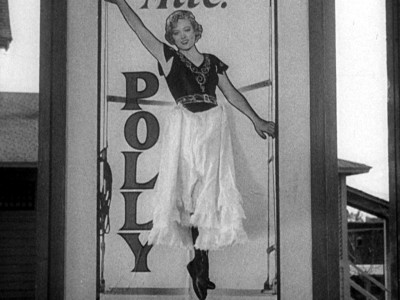
Red-hot pistol Polly (Marion Davies), a trapeze performer and the star attraction of the Nailor traveling circus, isn't amused when the circus train pulls into the small town of Oronta, where she spies her own revealing billboard posters covered up in panties and pantaloons. Polly barges into the local rectory, assuming Reverend John Hartley (Clark Gable) is to blame for the pious censorship, but good-natured, regular Joe Reverend Hartley assures her he had nothing to do with the cover-up: it's a town law, and her bill poster came up with the panties solution. Razzed by her circus co-workers for the humiliating posters, Polly is further thrown by a heckler in the audience, making her miss the trapeze bar during her act. Breaking her leg, she's taken to the closest home in Oronta―the Reverend's house―where the doctor insists she can't be moved for six weeks. Conveniently, Reverend Hartley's uncle, Bishop James Northcott (C. Aubrey Smith), the head of the diocese, had left the day before for six weeks on the road, so it's just the Reverend, Polly, the Reverend's housekeeper, and drunk handyman Downey (Raymond Hatton) in a cozy little set-up. Irreverent, curious Polly is eventually won over by Reverend Hartley's kind, non-judgmental attentions, and love soon flowers...but once the Bishop learns of this union, the lovers' lives become quite complicated.
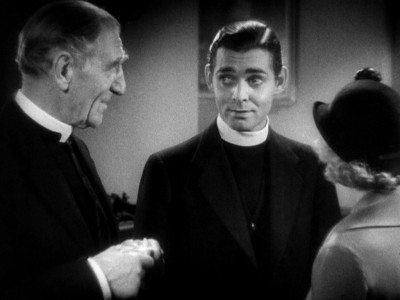
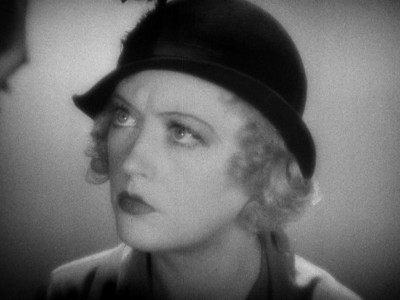
A haphazard, uneven melodrama with romantic comedy elements, Polly of the Circus seems curiously indicative of the pushme-pullyou direction Davies' career took under the watchful eye of her lover, publishing magnate William Randolph Hearst. A Cosmopolitan Pictures co-production with M-G-M (Hearst's vanity house for Davies), Polly of the Circus prominently credits the sharp, smart businesswoman Davies as her own producer, so it's possible she chose this project for herself, rather than giving into another heavy costume drama preferred by Hearst. Still, what could have been light and frothy and fun―qualities the delicious Davies excelled at bringing across, on and off-screen―frequently takes a turn towards rather sterile melodrama that is neither enjoyably hysterical nor quietly enlightening.
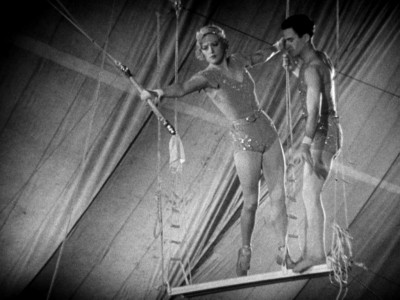
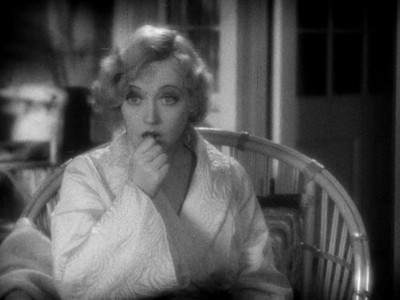
I don't particularly care if Polly of the Circus's plotline is wildly coincidental or contrived―after all, it's melodrama, not documentary. Romantic and dramatic improbabilities are the main attraction of the genre. So who cares if it's silly to set up Oronta as the first town the circus has encountered that has "decency" laws (if anything, back in the 1930s that would have been the majority of towns they'd have passed through). Or if it's improbable that a showboater like Polly would be upset by her posters getting covered up (if anything, that would mean even more publicity and notoriety for the circus...and more tickets sold). Or even more ridiculously, that one relatively innocent heckler would throw a pro like her enough for her to miss the trapeze bar, fifty feet up. Certainly, though, there's nothing contrived about the central obstacle to the lovers' happiness: the negative effect marrying Polly has on the Reverend's religious career (interestingly, the movie only shows the prejudice coming from the Reverend's uncle and the other diocese personnel, not the parishioners directly). Newer reviewers may not get that restrictive context, or will believe it to be horribly outdated, but back during a time when circus performers―especially the scantily clad ones―were thought of as little more than prostitutes by most folk, such a real-life marriage would have been scandalously received (beware feeling morally superior today, though―skip the church angle altogether and trespass against the P.C. "norms" of today's new secular religion, politics, and see how fast you're ostracized and vilified in certain environments).
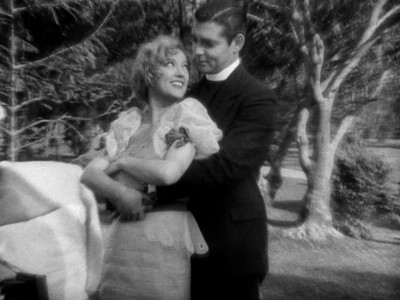
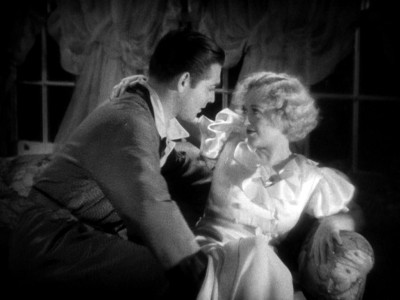
No, those dated elements don't bother me―Polly of the Circus's fluctuating tone, however, is unfortunately distracting. I've never seen the original silent version, so I can't compare; however, from what I've read, Polly of the Circus was a troubled production from the start, with Gable, Metro's new flavor of the month by 1932, extremely uncomfortable with his role (apparently rewrites were called for, and according to one source I read, he even briefly walked off the picture). Watching it now, Polly of the Circus feels like a movie pulled in different directions. Adapted by Carey Wilson (Mutiny on the Bounty, Judge Hardy and Son), with dialogue by Laurence E. Johnson, Polly of the Circus begins like a saucy little screwball comedy, with Davies cracking wise on the train, and the visual, slightly naughty comedy of the posters and pantaloons. When Davies barges into church and (incorrectly) upbraids Gable, we're primed for some flirtatious romantic comedy bantering...until we remember that ministers and reverends and priests didn't do that in Hollywood movies back then. Even though we're shown Gable to be a regular guy who boxes and showers and reads tabloids like the rest of us (?), when it comes to sex, he's at best a bashful altar boy, not the brawling sex animal of that same year's Red Dust. His affection towards Davies is brotherly, platonic and genial, not seething or tortured or rapturous. So we cool off into a very gentle romance, at times touching, yes (Davies is a wonderfully instinctual performer)...but decidedly one-sided, until we're back with a strange mixture of comedy and drama with the drunken Downey character (played for laughs until he inexplicably physically attacks Polly, to some inappropriately bright, chirpy music). And then its seesaw time as we go from the melodrama of Gable losing his job, to the light comedy of new wife Davies making a home for them, to more melodrama with Davies contemplating suicide in a ridiculous attempt to "free" Gable.
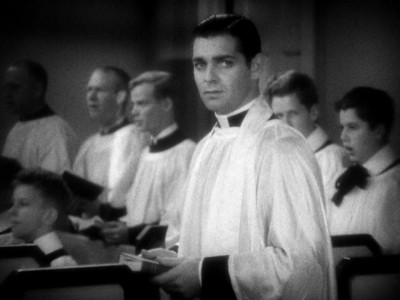
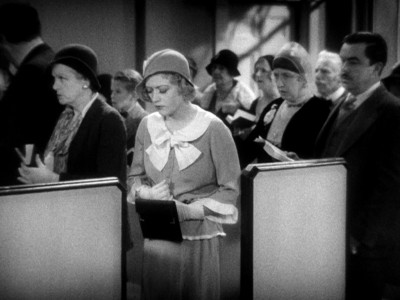
Had the movie makers ditched the pious dramatics and focused instead on sex and comedy, Polly of the Circus might have been something special; however, it looks like somebody actually took all this bunkum seriously (my money is on Hearst...), and it noticeably slows up the proceedings. Sure Gable is seriously miscast, but he's smooth during his scenes with Davies, kindly showing her character attention and affection without judgment (were the rumors true about their affair? Maybe, seeing how well they click together here...). Davies, when she doesn't have to suffer, is a delight, with a strange, modern hesitation to her line readings and an infectious connection with the viewer that makes you wish she had come along about thirty years later in Hollywood's timeline, to better put over her uniquely attractive comedic talents. Proving the old Hollywood axiom correct―that stars can sell anything to the public―Davies and Gable may be adrift in a movie that makes little dramatic sense and that fails to deliver any outsized romantic/comedic moments. However, they are entertaining whenever they're together on the screen, no matter how pseudo-serious they're acting. And that's enough to make Polly of the Circus worth a look.
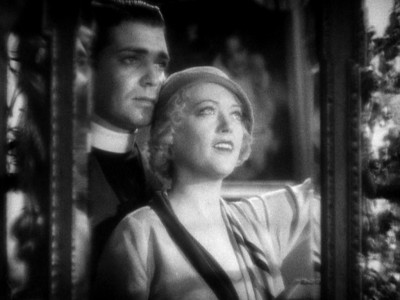
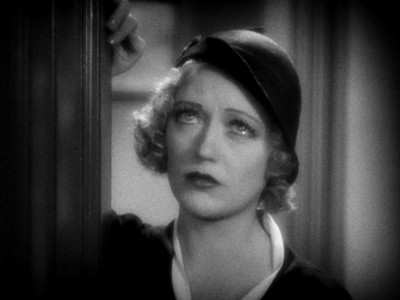
The DVD:
The Video:
The full-frame, 1.37:1 black and white transfer for Polly of the Circus looks good, with reasonable blacks (a bit dark at times), some grain, and a generally sharp image.
The Audio:
The Dolby Digital English mono audio track is acceptable, with moderate hiss and no closed-captions or subtitles available.
The Extras:
No extras for Polly of the Circus.
Final Thoughts:
Mishmashed twaddle...but with Davies and Gable, who cares? If anyone had had the guts to make this a romantic comedy, letting Gable be a wisecrackin', sexualized minister holding his own against red-hot trapeze artist Davies, Polly of the Circus might have been a classic. As it stands, it seems far too tame...and thoroughly confused. The performances, however, are enough. I'm recommending Polly of the Circus.
Paul Mavis is an internationally published movie and television historian, a member of the Online Film Critics Society, and the author of The Espionage Filmography.


|
| Popular Reviews |
| Sponsored Links |
|
|
| Sponsored Links |
|
|
| Release List | Reviews | Shop | Newsletter | Forum | DVD Giveaways | Blu-Ray | Advertise |
|
Copyright 2024 DVDTalk.com All Rights Reserved. Legal Info, Privacy Policy, Terms of Use,
Manage Preferences,
Your Privacy Choices | |||||||









